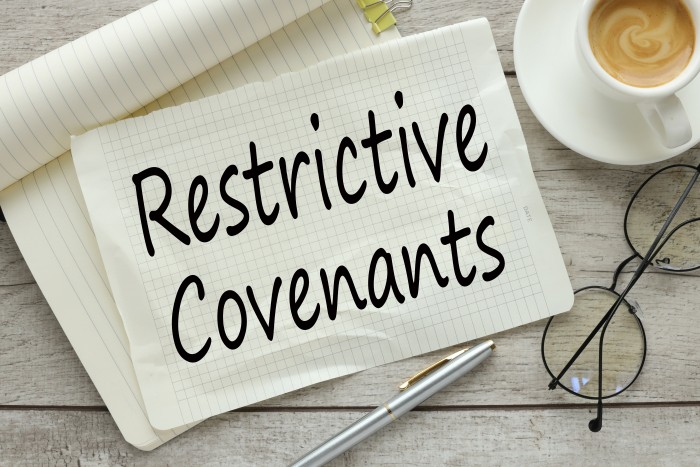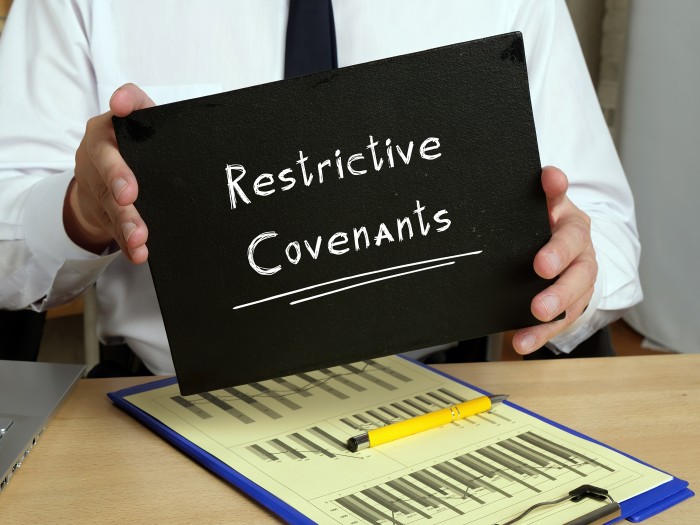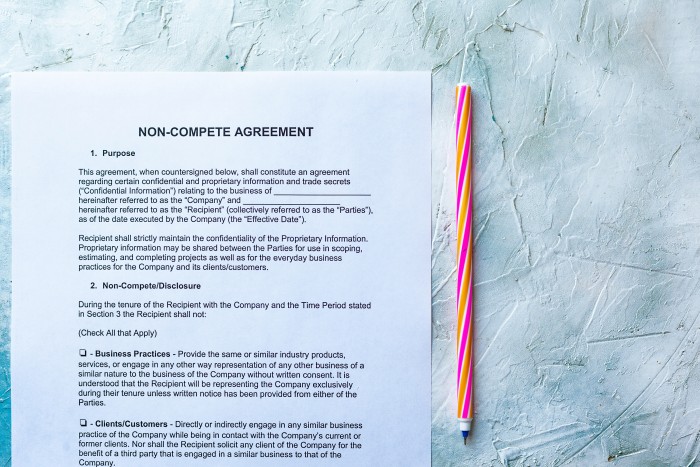
Restrictive Covenants Employment
Introduction to Restrictive Covenants Employment
This article looks at the world of restrictive covenants, a pivotal component of UK employment law. As a seasoned employment lawyer, I’ve supported numerous clients, just like you, in navigating this crucial yet often complex terrain.
First, let’s clear up what we mean by “restrictive covenants”. In a nutshell, these are contractual terms agreed between an employer and employee, designed to protect the employer’s business interests. They kick in after an employee’s exit and can limit their actions for a certain period.
There are a variety of restrictive covenants you can use:
- Non-compete clauses: prevent an ex-employee from setting up or joining a rival business.
- Non-solicitation/non-dealing clauses: stop an ex-employee from approaching your clients, customers or suppliers.
- Non-poaching clauses: restrain an ex-employee from enticing your other staff members away.
Now, you might be wondering, “Why do I need these covenants?”
Imagine a key employee leaving your business, armed with all your trade secrets, customer lists, marketing strategies, and more. They could potentially use this knowledge to start a competing business or join a competitor, causing significant harm to your enterprise.
In essence, restrictive covenants help to mitigate this risk, offering you a protective shield to safeguard your hard-earned business assets.
The Importance of Restrictive Covenants for Business Protection
Let’s look deeper into the world of restrictive covenants. We’ve already touched on what these covenants are and their various types. Now, I want to explain their immense importance to the health and longevity of your business.
No one can deny that your business is unique, with hard-won intellectual property, well-cultivated relationships with customers, a tailored approach to business development and a skilled team that makes it all possible. Wouldn’t you want to protect all of this? Of course, you would! Here’s where restrictive covenants come in.
To illustrate, consider these scenarios:
- With a non-compete clause, you prevent a former employee from becoming your direct competition. The last thing you need is someone who knows your strengths, weaknesses and trade secrets, turning them against you.
- Non-solicitation/non-dealing clauses ensure that your relationships with clients, customers or suppliers remain yours alone. These relationships are your lifeblood, and preserving them is paramount.
- With non-poaching clauses, you can keep your all-star team intact. This prevents an ex-employee from poaching your remaining staff, who are integral to your business operations and success.
Consider for a moment a scenario without these protections in place. An ex-employee, armed with insider knowledge, could pose a serious threat to your business. They could siphon away your clients, lure away your top talent, or set up a competing business using the strategies they learned while working for you.
In essence, without restrictive covenants, you leave your business exposed to potential harm and upheaval, threatening its stability and future growth.
The importance of restrictive covenants cannot be overstated. They are your safety net, protecting you from unfair competition and the potential misuse of your valuable business assets. As you implement these into your contracts, you’re not only securing your business, but you’re also investing in its future.
Key Elements to Make Legally Binding and Enforceable
Now that we understand the vital role restrictive covenants play in protecting your business, we need to discuss how to make these covenants legally enforceable. After all, a well-drafted covenant can be your shield, but only if it’s legally solid.
Let’s start with reasonableness. The law does not favour restrictions that are overly broad or unfair to the employee. It’s crucial to ensure that your restrictive covenants are reasonable in terms of duration, geographical scope, and the activities they restrict. Striking this balance is critical; too restrictive, and the court may deem the covenant unenforceable.
Next, we have specificity. Restrictive covenants must be specific and clear in their language. Ambiguity is your enemy here. Ensure your covenants clearly outline the restrictions, so both parties know exactly what’s expected of them.
Finally, we have the duration. This is all about balance. The restriction should be long enough to protect your interests, but not so long that it unnecessarily restrains the employee. Courts generally prefer shorter periods, usually up to 6-12 months, but it depends on the nature of the role and the business.
So, to recap, an enforceable restrictive covenant should be:
- Reasonable in its scope and restrictions
- Specific and clear in its language
- Balanced in terms of its duration
Mistakes can be costly when it comes to drafting restrictive covenants employment. A few common pitfalls include:
- One-size-fits-all approach: Remember, what works for one role might not work for another. Tailor your covenants to suit each role’s requirements.
- Ignoring updates: The business world is dynamic. As your business evolves, so should your restrictive covenants.
In short, creating an enforceable restrictive covenant is a careful balancing act. It demands a comprehensive understanding of the law and a nuanced approach that respects both your business’s needs and the rights of your employees.
Case Studies: Court Interpretations and Enforcement
Looking at case studies is like studying a roadmap, offering valuable insights into how courts interpret restrictive covenants. This knowledge can help you navigate the potential pitfalls and ensure your covenants are robust and enforceable.
For instance, let’s review the well-known case of Tillman v Egon Zehnder Ltd (2019). The Supreme Court clarified the “blue pencil test”, a legal tool that courts use to sever unenforceable parts of a covenant, leaving the rest in place. However, it was stressed that courts can only do this if the remaining terms continue to make sense without the severed part. This landmark decision underlines the importance of careful drafting.
Another intriguing case is Capgemini India Private Ltd v Krishnan Deepak and others (2019), where Capgemini secured an injunction against former employees who started a competing business. The High Court found that the restrictive covenant was valid and enforceable, illustrating the effectiveness of well-drafted covenants in safeguarding business interests.
A few key takeaways from these cases:
- Precise drafting is crucial. Ambiguity or overreaching can lead to a covenant being unenforceable.
- Courts won’t hesitate to enforce a well-drafted covenant that is reasonable and necessary to protect legitimate business interests.
- Even a global powerhouse can fall foul of improperly drafted covenants, leading to unnecessary legal battles and potential loss of protection.
In the world of UK employment law, case law serves as both a compass and a warning. It offers guidance on what the courts view as reasonable and enforceable, while cautioning against potential pitfalls in drafting and implementing restrictive covenants.
Best Practices for Implementing Restrictive Covenants in Your Business
Now, let’s explore how you can effectively introduce these covenants into your business. After all, knowledge without action is like a ship without a sail!
When introducing restrictive covenants, communication is key. You need to make sure your employees understand why these covenants are necessary and how they contribute to the overall success and stability of the business. Open dialogue can help to eliminate any misconceptions or fears, fostering a climate of trust and transparency.
As for existing employees, changes to their contracts need to be handled carefully. In most cases, you’ll need to provide some form of new benefit, or “consideration” to make the changes legally binding. Legal advice is essential here to ensure you navigate this process correctly.
The best practices for implementing restrictive covenants:
- Customise for each role: A one-size-fits-all approach rarely works. Tailor your covenants based on the specific role and its potential to harm your business if misused.
- Review and update regularly: Business needs change over time. Regularly review your covenants to ensure they still serve your interests and comply with any changes in the law.
- Take legal advice: Restrictive covenants are complex and mistakes can be costly. A specialist employment lawyer can provide valuable guidance and help you draft effective, legally compliant covenants.
Managing restrictive covenants isn’t a one-off task but an ongoing commitment. Monitor their effectiveness, seek regular legal advice, and don’t be afraid to make necessary changes. Remember, your restrictive covenants are living, breathing parts of your contracts and they need care and attention to stay healthy and effective.
In conclusion, mastering the use of restrictive covenants is not just about protecting your business today, but also about ensuring its growth and success tomorrow.
FAQs on Restrictive Covenants in Employment
- What is a restrictive covenant? A restrictive covenant is a contractual term that limits an employee’s actions after they leave your business, helping to protect your legitimate business interests.
- Why are restrictive covenants important for my business? These covenants protect your business from potential threats that may arise when an employee leaves, such as competition, client or staff poaching or misuse of sensitive business information.
- How long can a restrictive covenant last? The duration depends on the nature of the covenant and the specific role. However, it should be reasonable; typically, courts prefer shorter periods, usually up to 6-12 months.
- How do I implement restrictive covenants for existing employees? You’ll usually need to offer a new benefit or “consideration” to make changes legally binding. It’s advisable to seek legal advice to ensure you’re handling this process correctly.
- Can I use the same restrictive covenants for all employees? No, it’s recommended to tailor your covenants based on the role and its potential to impact your business if misused. A one-size-fits-all approach may not be enforceable.
- What happens if a former employee breaches a restrictive covenant? If a breach occurs, you may take legal action, including seeking an injunction to stop the breach or claiming damages.
- How often should I review my restrictive covenants? As a best practice, review them regularly to ensure they remain relevant to your changing business needs and comply with any changes in law.
I hope these answers help clarify the role and significance of restrictive covenants in employment. If you have any more questions, feel free to reach out to a legal professional for detailed advice.
Call John Bloor at EBS Law on 01625 87 4400 if you are an employer and need free Employment Law Advice.


